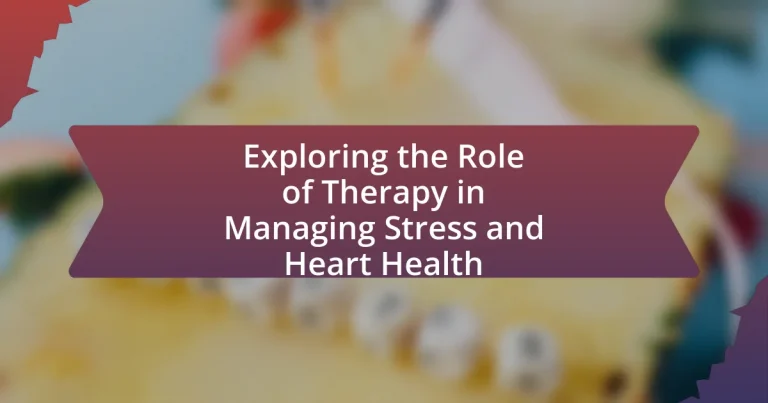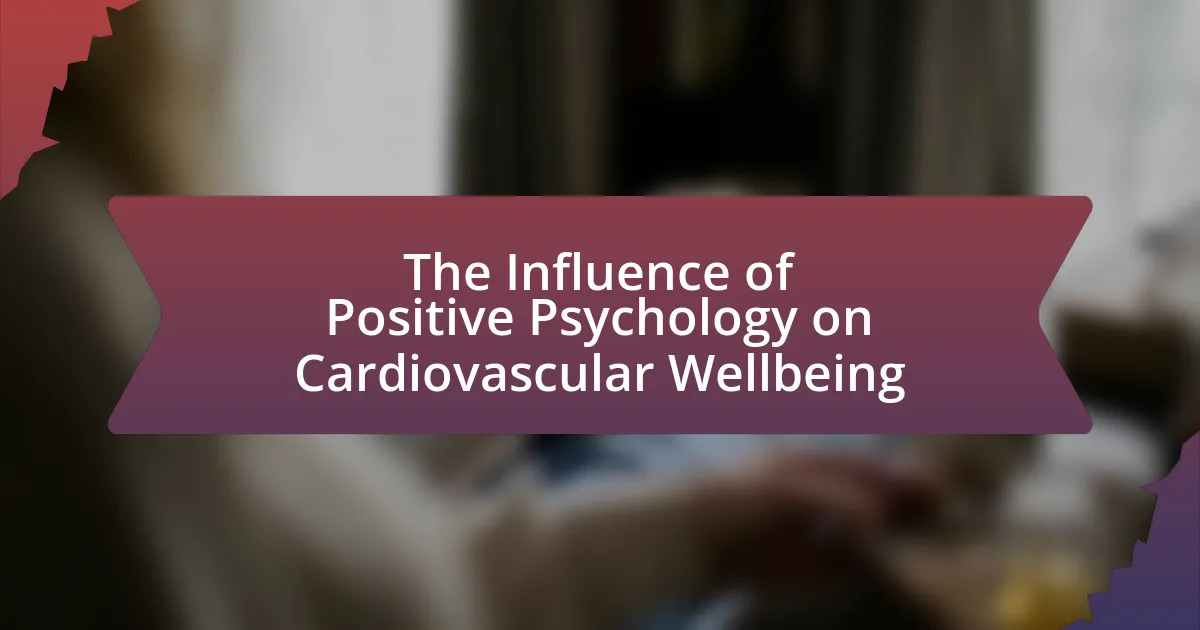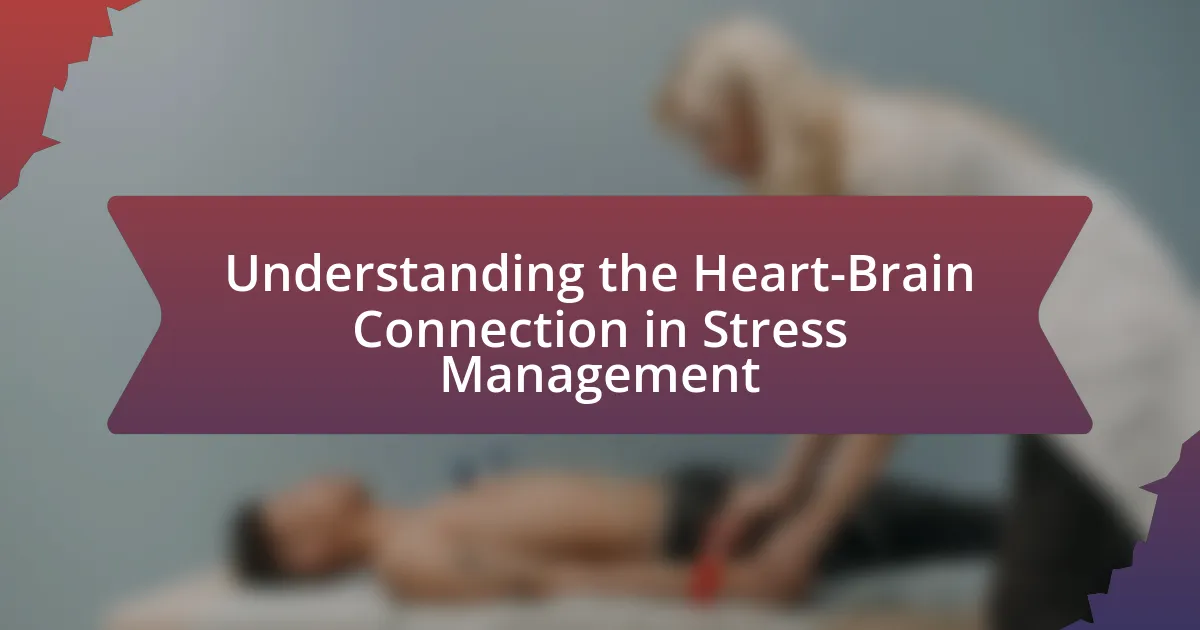The article explores the critical relationship between therapy, stress management, and heart health. It highlights how therapeutic practices, particularly Cognitive Behavioral Therapy (CBT) and Mindfulness-Based Stress Reduction (MBSR), effectively reduce stress levels, which are linked to cardiovascular diseases. The physiological effects of stress on the heart, the role of therapy in improving heart health outcomes, and the importance of integrating therapy into stress management routines are discussed. Additionally, the article addresses barriers to seeking therapy and outlines practical steps individuals can take to enhance their emotional well-being and cardiovascular health through therapeutic interventions.

What is the relationship between therapy, stress, and heart health?
Therapy plays a crucial role in managing stress, which in turn significantly impacts heart health. Stress triggers physiological responses that can lead to increased heart rate and blood pressure, contributing to cardiovascular diseases. Research indicates that individuals who engage in therapeutic practices, such as cognitive-behavioral therapy or mindfulness-based stress reduction, experience lower levels of stress and improved heart health outcomes. For instance, a study published in the Journal of the American College of Cardiology found that patients who participated in stress management programs showed a 30% reduction in heart disease risk factors. Thus, effective therapy can mitigate stress and promote better cardiovascular health.
How does therapy help in managing stress?
Therapy helps in managing stress by providing individuals with coping strategies and emotional support. Through various therapeutic techniques, such as cognitive-behavioral therapy (CBT), individuals learn to identify and challenge negative thought patterns that contribute to stress. Research indicates that CBT can reduce stress levels by up to 50% in some individuals, as it equips them with tools to reframe their thinking and develop healthier responses to stressors. Additionally, therapy fosters a safe environment for individuals to express their feelings, which can alleviate the emotional burden of stress and promote overall mental well-being.
What types of therapy are most effective for stress management?
Cognitive Behavioral Therapy (CBT) and Mindfulness-Based Stress Reduction (MBSR) are among the most effective therapies for stress management. CBT focuses on identifying and changing negative thought patterns that contribute to stress, while MBSR incorporates mindfulness practices to enhance awareness and reduce anxiety. Research has shown that CBT can lead to significant reductions in stress levels, with a meta-analysis indicating an effect size of 0.88 for stress reduction (Hofmann et al., 2012, Cognitive Therapy and Research). Similarly, MBSR has been found to decrease stress and improve emotional regulation, with studies demonstrating its efficacy in various populations, including those with chronic illnesses (Kabat-Zinn, 1990, Journal of Behavioral Medicine).
How do different therapeutic approaches impact stress levels?
Different therapeutic approaches significantly impact stress levels by employing various techniques to reduce anxiety and promote emotional well-being. Cognitive Behavioral Therapy (CBT) has been shown to effectively lower stress by helping individuals identify and change negative thought patterns, leading to improved coping strategies. A meta-analysis published in the Journal of Consulting and Clinical Psychology found that CBT reduced stress levels in 70% of participants across multiple studies.
Mindfulness-based therapies, such as Mindfulness-Based Stress Reduction (MBSR), also demonstrate a substantial impact on stress reduction. Research published in the journal Health Psychology Review indicates that MBSR can decrease stress by enhancing individuals’ awareness and acceptance of their thoughts and feelings, resulting in lower cortisol levels.
Additionally, interpersonal therapy focuses on improving relationships and social support, which can mitigate stress. A study in the American Journal of Psychiatry revealed that individuals undergoing interpersonal therapy reported lower stress levels due to enhanced communication and relationship skills.
Overall, the effectiveness of these therapeutic approaches in managing stress is supported by empirical evidence, highlighting their role in promoting mental health and well-being.
Why is managing stress important for heart health?
Managing stress is crucial for heart health because chronic stress can lead to increased blood pressure, heart rate, and inflammation, all of which are risk factors for cardiovascular disease. Research indicates that individuals with high stress levels are more likely to experience heart-related issues; for instance, a study published in the Journal of the American College of Cardiology found that stress management techniques can significantly reduce the risk of heart disease. By effectively managing stress through therapy and other interventions, individuals can lower these physiological responses, thereby promoting better heart health and reducing the likelihood of heart attacks and strokes.
What are the physiological effects of stress on the heart?
Stress has significant physiological effects on the heart, primarily increasing heart rate and blood pressure. When an individual experiences stress, the body releases stress hormones such as adrenaline and cortisol, which stimulate the heart to beat faster and constrict blood vessels, leading to elevated blood pressure. Chronic stress can contribute to long-term cardiovascular issues, including hypertension, increased risk of heart attack, and heart disease. Research indicates that individuals with high stress levels are more likely to develop these conditions, highlighting the importance of stress management for heart health.
How does chronic stress contribute to heart disease?
Chronic stress contributes to heart disease by triggering physiological responses that can lead to cardiovascular issues. When an individual experiences prolonged stress, the body releases stress hormones such as cortisol and adrenaline, which can increase heart rate and blood pressure. Over time, these elevated levels can damage blood vessels and promote inflammation, both of which are risk factors for heart disease. Research indicates that chronic stress is associated with a higher incidence of heart attacks and strokes, as evidenced by a study published in the Journal of the American College of Cardiology, which found that individuals with high stress levels had a 40% increased risk of coronary heart disease.
What role does therapy play in improving heart health?
Therapy plays a significant role in improving heart health by effectively managing stress, which is a known risk factor for cardiovascular diseases. Psychological therapies, such as cognitive-behavioral therapy (CBT), have been shown to reduce anxiety and depression, leading to lower blood pressure and improved heart function. Research published in the Journal of the American College of Cardiology indicates that patients who engage in therapy experience better adherence to heart-healthy behaviors, such as exercise and diet, which further enhances cardiovascular health.
How can therapy reduce the risk of heart-related issues?
Therapy can reduce the risk of heart-related issues by effectively managing stress and emotional well-being. Stress is a significant contributor to cardiovascular problems, as it can lead to increased blood pressure, inflammation, and unhealthy coping mechanisms such as poor diet and lack of exercise. Research indicates that individuals who engage in therapy, such as cognitive-behavioral therapy or mindfulness-based stress reduction, experience lower levels of stress and anxiety, which in turn can lead to improved heart health. For instance, a study published in the Journal of the American College of Cardiology found that patients who participated in stress management programs had a 50% reduction in the risk of heart attacks compared to those who did not. This evidence supports the conclusion that therapy plays a crucial role in mitigating factors that contribute to heart-related issues.
What evidence supports the effectiveness of therapy for heart health?
Therapy has been shown to effectively improve heart health by reducing stress and its associated risks. Research indicates that psychological interventions, such as cognitive-behavioral therapy (CBT), can lower blood pressure and improve heart rate variability, which are critical indicators of cardiovascular health. A study published in the Journal of the American College of Cardiology found that patients who participated in stress management therapy experienced a significant reduction in heart disease risk factors, including lower cholesterol levels and improved lifestyle choices. Additionally, a meta-analysis in the journal Health Psychology demonstrated that individuals undergoing therapy reported decreased anxiety and depression, leading to better adherence to heart-healthy behaviors. These findings collectively support the effectiveness of therapy in promoting heart health through stress reduction and behavioral change.
How can individuals integrate therapy into their stress management routine?
Individuals can integrate therapy into their stress management routine by scheduling regular therapy sessions, which provide structured support and coping strategies. Engaging in therapy allows individuals to explore their stressors in a safe environment, learn effective stress management techniques, and develop personalized coping mechanisms. Research indicates that cognitive-behavioral therapy (CBT) can significantly reduce stress levels, as evidenced by a study published in the Journal of Consulting and Clinical Psychology, which found that participants experienced a 50% reduction in stress symptoms after a series of CBT sessions. By consistently attending therapy, individuals can create a proactive approach to managing stress, leading to improved emotional well-being and heart health.
What are the common barriers to seeking therapy for stress management?
Common barriers to seeking therapy for stress management include stigma, financial constraints, lack of awareness, and accessibility issues. Stigma surrounding mental health can deter individuals from pursuing therapy due to fear of judgment. Financial constraints are significant, as therapy can be costly and not all insurance plans cover mental health services. Lack of awareness about the benefits of therapy and available resources can prevent individuals from seeking help. Additionally, accessibility issues, such as the availability of qualified therapists in certain areas or transportation difficulties, further hinder access to therapy. These barriers collectively contribute to the underutilization of therapeutic services for stress management.
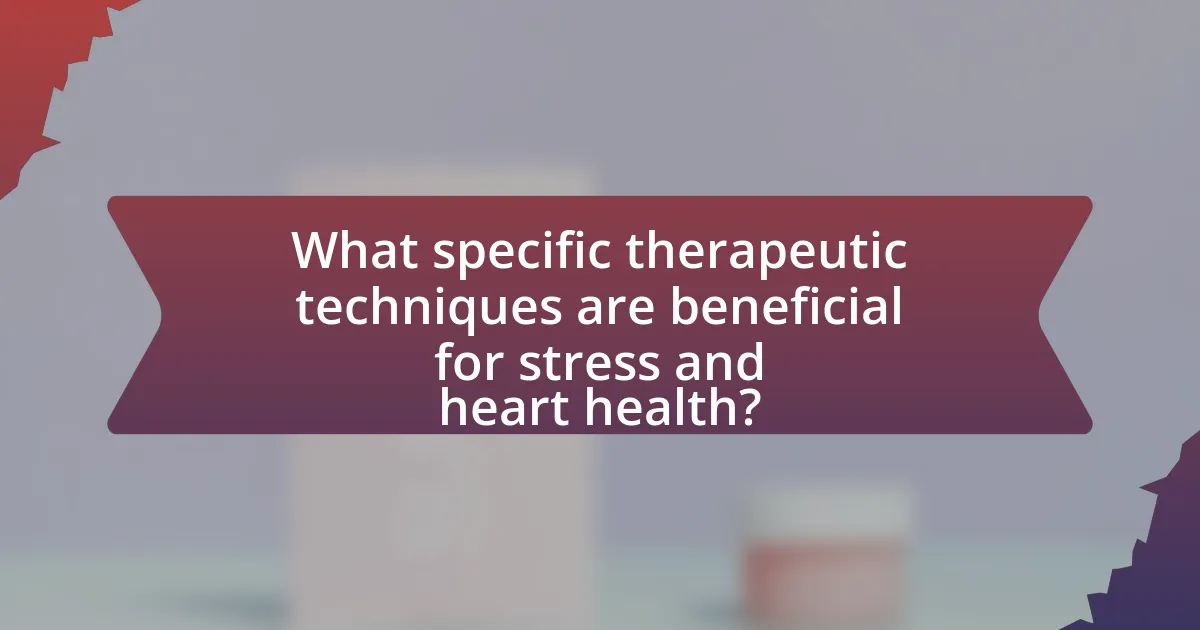
What specific therapeutic techniques are beneficial for stress and heart health?
Cognitive Behavioral Therapy (CBT) and mindfulness-based stress reduction (MBSR) are specific therapeutic techniques beneficial for stress and heart health. CBT helps individuals identify and change negative thought patterns, which can reduce stress and improve emotional well-being, thereby positively impacting heart health. Research published in the Journal of the American College of Cardiology indicates that patients with heart disease who engage in CBT experience lower levels of anxiety and depression, which are risk factors for heart issues. MBSR, on the other hand, incorporates mindfulness meditation and yoga, which have been shown to lower blood pressure and improve heart rate variability, contributing to better cardiovascular health. A study in the journal Health Psychology found that participants practicing MBSR reported significant reductions in stress and improvements in heart health markers.
How does cognitive-behavioral therapy (CBT) address stress?
Cognitive-behavioral therapy (CBT) addresses stress by helping individuals identify and modify negative thought patterns and behaviors that contribute to their stress levels. CBT teaches coping strategies, such as problem-solving skills and relaxation techniques, which empower individuals to manage their stress more effectively. Research indicates that CBT can significantly reduce stress and improve overall mental health, as evidenced by a meta-analysis published in the journal “Psychological Bulletin,” which found that CBT is effective in reducing anxiety and stress-related symptoms across various populations.
What are the key principles of CBT in relation to stress management?
The key principles of Cognitive Behavioral Therapy (CBT) in relation to stress management include cognitive restructuring, behavioral activation, and the development of coping strategies. Cognitive restructuring involves identifying and challenging negative thought patterns that contribute to stress, allowing individuals to reframe their perspectives and reduce anxiety. Behavioral activation encourages engagement in positive activities to counteract feelings of helplessness and promote emotional well-being. Additionally, CBT emphasizes the importance of developing effective coping strategies, such as problem-solving skills and relaxation techniques, which have been shown to enhance resilience against stress. Research indicates that these principles can lead to significant reductions in stress levels and improvements in overall mental health, as evidenced by studies demonstrating the efficacy of CBT in various populations.
How effective is CBT in improving heart health outcomes?
Cognitive Behavioral Therapy (CBT) is effective in improving heart health outcomes by reducing stress and anxiety, which are significant risk factors for cardiovascular diseases. Studies indicate that patients who undergo CBT experience lower blood pressure and improved heart rate variability, both of which are indicators of better cardiovascular health. For instance, a meta-analysis published in the Journal of the American College of Cardiology found that CBT significantly reduced anxiety and depression in cardiac patients, leading to improved adherence to treatment and lifestyle changes that benefit heart health.
What role does mindfulness and meditation play in therapy?
Mindfulness and meditation play a crucial role in therapy by enhancing emotional regulation and reducing stress. These practices help individuals develop greater awareness of their thoughts and feelings, which can lead to improved coping strategies and a decrease in anxiety and depression symptoms. Research indicates that mindfulness-based interventions, such as Mindfulness-Based Stress Reduction (MBSR), have been shown to significantly lower stress levels and improve overall mental health outcomes. For instance, a meta-analysis published in JAMA Internal Medicine found that mindfulness meditation programs can lead to moderate improvements in anxiety, depression, and pain, demonstrating the effectiveness of these techniques in therapeutic settings.
How do mindfulness practices reduce stress levels?
Mindfulness practices reduce stress levels by promoting present-moment awareness and decreasing rumination. Engaging in mindfulness techniques, such as meditation and deep breathing, activates the body’s relaxation response, which lowers cortisol levels, a hormone associated with stress. Research published in the journal “Health Psychology” by Goyal et al. (2014) found that mindfulness meditation programs significantly improved stress-related outcomes, demonstrating a reduction in anxiety and emotional distress among participants. This evidence supports the effectiveness of mindfulness in managing stress and enhancing overall well-being.
What impact does mindfulness have on cardiovascular health?
Mindfulness positively impacts cardiovascular health by reducing stress and promoting relaxation, which can lead to lower blood pressure and improved heart rate variability. Research indicates that mindfulness practices, such as meditation and focused breathing, can decrease the body’s stress response, thereby reducing the risk of heart disease. A study published in the Journal of the American College of Cardiology found that participants who engaged in mindfulness-based stress reduction experienced significant improvements in cardiovascular risk factors, including lower systolic blood pressure and improved cholesterol levels. This evidence supports the conclusion that mindfulness can be an effective tool in enhancing cardiovascular health.
How can group therapy contribute to stress relief?
Group therapy can significantly contribute to stress relief by providing a supportive environment where individuals can share experiences and coping strategies. This collective sharing fosters a sense of belonging and reduces feelings of isolation, which are common stressors. Research indicates that group therapy can lower anxiety and depression levels, with studies showing that participants often report improved emotional well-being and reduced stress after sessions. For instance, a meta-analysis published in the Journal of Consulting and Clinical Psychology found that group therapy is effective in reducing symptoms of anxiety and depression, which are closely linked to stress.
What are the benefits of group therapy for stress management?
Group therapy for stress management offers several benefits, including enhanced support, shared experiences, and improved coping strategies. Participants in group therapy often find comfort in knowing they are not alone in their struggles, which can reduce feelings of isolation and anxiety. Research indicates that group therapy can lead to significant reductions in stress levels, as individuals learn from each other’s experiences and gain new perspectives on their challenges. Additionally, a study published in the Journal of Consulting and Clinical Psychology found that group therapy can be as effective as individual therapy for treating stress-related issues, highlighting its efficacy in fostering emotional resilience and promoting healthier coping mechanisms.
How does social support in group therapy affect heart health?
Social support in group therapy positively affects heart health by reducing stress and promoting emotional well-being. Research indicates that individuals who participate in group therapy experience lower levels of anxiety and depression, which are linked to cardiovascular issues. A study published in the Journal of the American College of Cardiology found that patients with heart disease who engaged in support groups had improved heart health outcomes, including lower blood pressure and better overall heart function. This demonstrates that the emotional and psychological benefits of social support can lead to significant improvements in physical health, particularly concerning heart health.
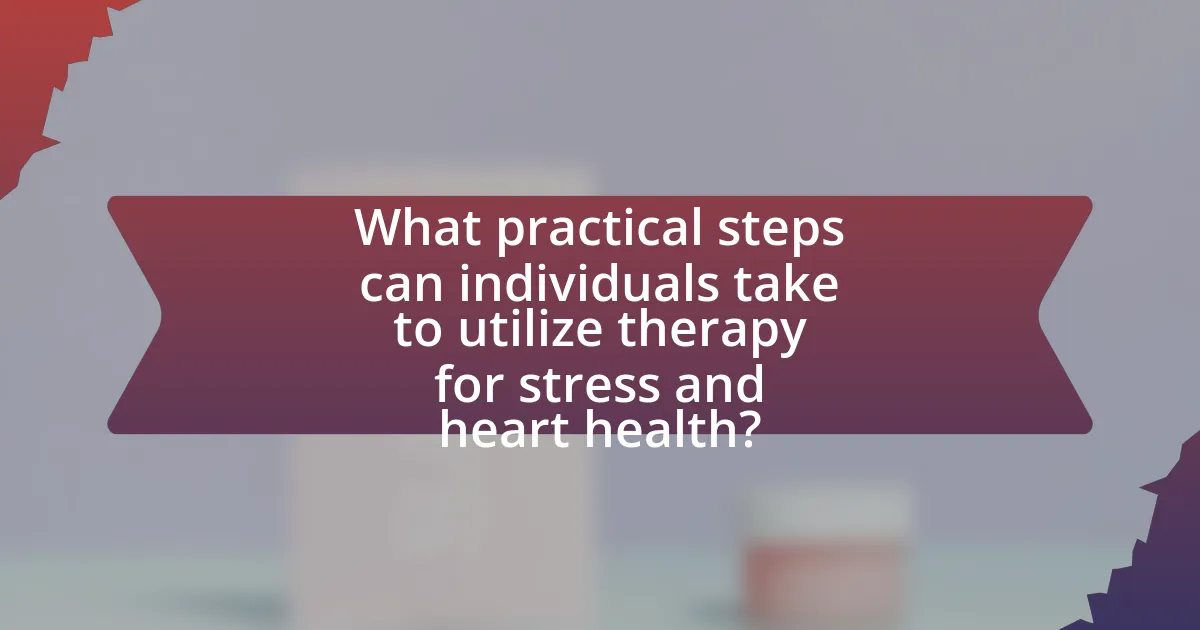
What practical steps can individuals take to utilize therapy for stress and heart health?
Individuals can utilize therapy for stress and heart health by engaging in cognitive-behavioral therapy (CBT), mindfulness-based stress reduction (MBSR), and regular sessions with a licensed therapist. CBT helps individuals identify and change negative thought patterns that contribute to stress, which has been shown to lower blood pressure and improve heart health. MBSR incorporates mindfulness techniques that reduce anxiety and promote relaxation, leading to better cardiovascular outcomes. Research indicates that therapy can significantly decrease stress levels, which is linked to a 30% reduction in the risk of heart disease. Regular therapy sessions provide ongoing support and coping strategies, enhancing overall emotional well-being and heart health.
How can one find the right therapist for stress management?
To find the right therapist for stress management, one should start by identifying their specific needs and preferences, such as the therapist’s specialization in stress-related issues. Research indicates that therapists with expertise in cognitive-behavioral therapy (CBT) or mindfulness-based approaches are particularly effective for stress management. A study published in the Journal of Consulting and Clinical Psychology found that CBT significantly reduces stress levels in patients.
Next, individuals can seek recommendations from healthcare providers, friends, or family, and utilize online directories that list licensed therapists. It is also beneficial to read reviews and check credentials to ensure the therapist is qualified. Finally, scheduling initial consultations can help assess compatibility and therapeutic style, which is crucial for effective stress management.
What are some self-help strategies to complement therapy?
Self-help strategies that complement therapy include mindfulness practices, regular physical exercise, and journaling. Mindfulness practices, such as meditation and deep breathing exercises, have been shown to reduce stress and improve emotional regulation, which can enhance the therapeutic process. Regular physical exercise, supported by research from the American Heart Association, is linked to improved mental health and reduced anxiety, making it a beneficial addition to therapy. Journaling allows individuals to process emotions and reflect on their thoughts, which can provide valuable insights during therapy sessions. These strategies collectively support mental well-being and can enhance the effectiveness of therapeutic interventions.
How can lifestyle changes enhance the benefits of therapy?
Lifestyle changes can significantly enhance the benefits of therapy by improving overall mental and physical health, which supports therapeutic outcomes. For instance, regular exercise has been shown to reduce symptoms of anxiety and depression, thereby making individuals more receptive to therapeutic interventions. A study published in the Journal of Clinical Psychiatry found that physical activity can lead to a 20-30% reduction in depressive symptoms, which complements the effects of psychotherapy. Additionally, adopting a balanced diet rich in omega-3 fatty acids and antioxidants can improve brain function and emotional regulation, further enhancing the effectiveness of therapy. Research from the American Heart Association indicates that lifestyle modifications, such as stress management techniques and improved sleep hygiene, can lower stress levels, which is crucial for heart health and can lead to better engagement in therapy.
What role does exercise play in managing stress and supporting heart health?
Exercise plays a crucial role in managing stress and supporting heart health by reducing stress hormones and improving cardiovascular function. Engaging in regular physical activity stimulates the production of endorphins, which are natural mood lifters that can alleviate feelings of stress and anxiety. Additionally, exercise enhances blood circulation, lowers blood pressure, and improves heart efficiency, contributing to overall cardiovascular health. Research indicates that individuals who engage in moderate-intensity exercise for at least 150 minutes per week experience significant reductions in stress levels and a lower risk of heart disease, as supported by findings from the American Heart Association.
